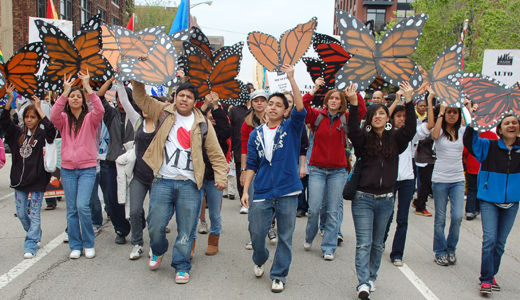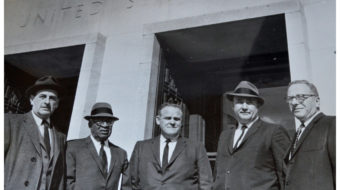
It’s often forgotten, but May Day, the original, real, workers’ holiday, originated in the U.S. And specifically it originated to honor the memory of labor’s four martyrs unjustly sent to the gallows, in an atmosphere of hysteria and anti-worker oppression after the so-called Haymarket “riot” of 130 years ago, on May 4, 1886.
An extensive history of Haymarket and its aftermath, written about 40 years ago by William Adelman of the Illinois Labor History Society, sets out the genesis of May Day and links the commemoration with the protest – and the campaign for the 8-hour working day.
“Workers in the U.S. had been fighting since the days of Andrew Jackson’s administration for shorter working hours,” Adelman explains in Haymarket Revisited. “Under President (Martin) Van Buren, federal employees won the 10-hour day. The government was expected to be a model for the private sector, but private employers refused to follow voluntarily the government’s example. Workers found they had to strike each individual employer to win the shorter hours.”
The first connection between May Day and workers was in Chicago in 1867, Adelman asserts. But the movement gained momentum in 1884 when the Federation of Organized Trade and Labor Unions of the United States and Canada – which later renamed itself the American Federation of Labor – passed a resolution making May Day the workers’ day.
“Resolved,” said the resolution, offered by Gabriel Edmonston of the Carpenters, “that eight hours shall constitute a legal day’s labor, from and after May 1, 1886, and that we recommend to labor unions throughout this jurisdiction” – both countries – “that they so direct their laws to confirm to this resolution.”
They sure did. That May 1, 340,000 workers in 12,000 U.S. factories laid down their tools and struck. Almost one-quarter of them were in Chicago. The leaders of May Day – including Albert Parsons, one of the unionists later unjustly tried and hanged for inciting Haymarket – led an 80,000-person parade, marching arm-in-arm, singing, through downtown.
The factors that led to the Haymarket trial and verdicts, including police repression of workers, corporate criminals determined to crush any sign of resistance, skewed press coverage and more than a little class warfare, were present then. They’re present now.
And the lack of a political path to power – ballot-box stuffing and outright fraud had deprived workers’ candidates of election victories – sent workers into the streets, too.
Does all this sound familiar? Unjust trials of workers on trumped-up charges with false evidence have occurred in the U.S. down through the years. The radical right and its business backers have spent the last six years disenfranchising workers. We have had to take to the streets – North Carolina’s Moral Mondays movement is only the latest instance – in protest.
And class warfare continues, pitting the 1 percent against the rest of us.
Oh, yes, one more thing: When courageous politicians stand up for workers, the rich, the right wing and the corporate criminals unite to undo our gains and beat them at the polls.
Just ask John Peter Altgeld. May he, who pardoned the remaining Haymarket prisoners, accompanying that with a scathing indictment of the criminal injustice system, rest in peace.
And, despite all the disappointments we have because he did not push workers’ rights, labor law reform and more pro-worker legislation, just ask Barack Obama.
Steelworkers President Leo Gerard was right, more than a year ago, when he bluntly said that the reason the Right and the Republicans oppose and hamstring everything Obama tries – including the Employee Free Choice Act – is because of the president’s race.
So as we pause on May Day, let’s remember those who struggled and those who died in the workers’ cause. They deserve much more than just a march or two.
They deserve like courage and resolve from the rest of us, to fight the continuing battle against those who would divide and conquer – men and women, black, brown and red and white, gay and straight – and put workers down.
Photo: Chicago, May 1, 2008. | Pepe Lozano/PW










